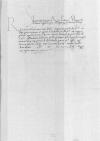Letter #5688
Sigismund I Jagiellon to Ioannes DANTISCUSCracow (Kraków), 1537-04-24
| received [1537]-05-07 Manuscript sources:
| ||||
Text & apparatus & commentary Plain text Text & commentary Text & apparatus
Reverendo in Christo Patri, domino
Reverende in Christo Pater, sincere nobis dilecte.
Unguentum, quod nobis Paternitas Vestra misit, grate accepimus
et agimus ac habeamus pro illo Paternitati Vestrae magnas gratias. Quod licet prius a reverendissimo domino
Quae bene ac feliciter valeat.
Datae

